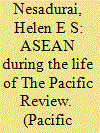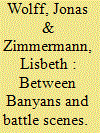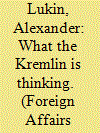| Srl | Item |
| 1 |
ID:
155097


|
|
|
|
|
| Summary/Abstract |
Recent studies of ASEAN have focused on why ASEAN community building has emphasised liberal norms such as human rights, democracy promotion and a commitment to wider participation while maintaining a set of sovereignty-preserving regional principles – the ASEAN Way norms – that have been more suited to securing illiberal agendas and the authoritarian practices of state elites. ASEAN's seeming progressive turn is argued to be instrumentally aimed at buttressing the legitimacy of the grouping as a credible regional institution in international society in which these norms are widely accepted though not uncontested. With recent developments suggesting further consolidation of, or a return to, authoritarian tendencies across the region, state-based modes of governance may become more limited in terms of what ASEAN member states are prepared to endorse. It is, therefore, time for scholars to expand analysis to explore how transnational issues and problems may be functionally governed outside of formal regional institutions involving non-state actors in key roles. While the turn to privately generated standards, rules and practices in global governance is well-recognised and researched, the disparate studies on private governance in South-East Asia are rarely cumulated into a more coherent research programme that addresses the effectiveness of private governance as well as its normative implications. These questions point to a promising agenda for research on regional and other transnational modes of governance in South-East Asia.
|
|
|
|
|
|
|
|
|
|
|
|
|
|
|
|
| 2 |
ID:
145513


|
|
|
|
|
| Summary/Abstract |
In studying the global spread and implementation of liberal norms, scholars have moved from linear notions of norm diffusion and promotion to an emphasis on norm contestation. Contestation by the supposed beneficiaries and addressees has taken centre stage in both research on the norms that underpin global governance and in studies on democracy promotion and liberal peacebuilding. While the impetus of this scholarship is normative – to overcome the taken-for-granted nature of liberal norms – the concept of contestation itself is mainly used with an analytical interest. Yet, as we show in this article, contestation also comes with – oftentimes implicit – normative connotations. Focusing on the seminal work of Milja Kurki, Oliver Richmond, Antje Wiener, and Amitav Acharya, we reconstruct these normative connotations. It turns out that the normative take on contestation is fairly conventional in all four approaches. Contestation is largely seen as a means to enable dialogue, as illustrated by Acharya’s metaphor of the Banyan tree. Fundamental conflicts over liberal norms (‘battle scenes’) are either not considered or seen as normatively undesirable. As a way forward, we propose a typology that enables scholars to empirically analyse contestation in its different expressions and suggest two strategies to normatively assess practices of contestation.
|
|
|
|
|
|
|
|
|
|
|
|
|
|
|
|
| 3 |
ID:
132134


|
|
|
|
|
| Publication |
2014.
|
| Summary/Abstract |
Soon after the Soviet Union's collapse in 1991, Western leaders began to think of Russia as a partner. Although Washington and its friends in Europe never considered Moscow a true ally, they assumed that Russia shared their basic domestic and foreign policy goals and would gradually come to embrace Western-style democracy at home and liberal norms abroad. That road would be bumpy, of course. But Washington and Brussels attributed Moscow's distinctive politics to Russia's national peculiarities and lack of experience with democracy. And they blamed the disagreements that arose over the former Yugoslavia, Iraq, and Iran on the short time Russia had spent under Western influence. This line of reasoning characterized what could be termed the West's post-Soviet consensus view of Russia.
|
|
|
|
|
|
|
|
|
|
|
|
|
|
|
|